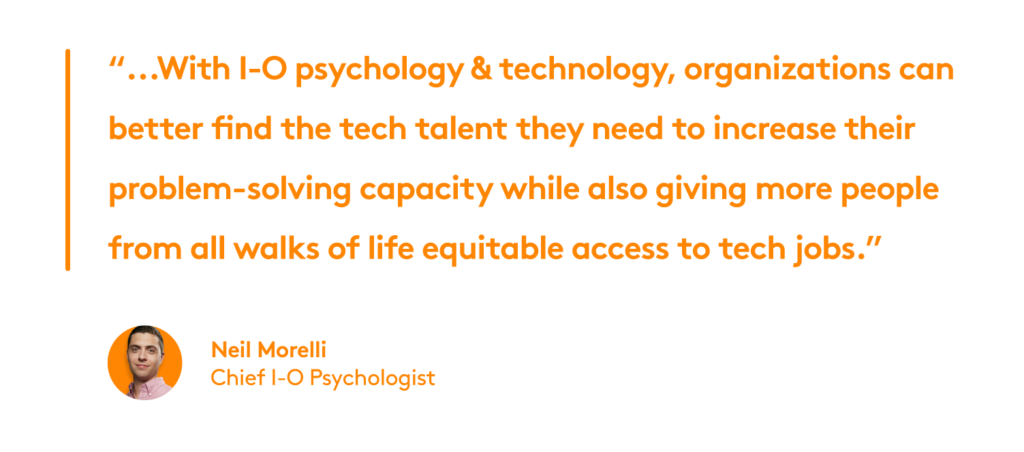Be the first to know
Sign up for a weekly dose of tech hiring news and updates.
The most exciting part of my role as Chief Industrial-Organizational (I-O) Psychologist at Codility is that I get to find new ways to add psychological science to our products. To me, this is the secret to improving how we hire for tech jobs.
Tech hiring is more important than ever because we’re living in a more distributed and digital world than ever. So, I truly believe that now is the time for I-O psychology and technology to work together. Together, organizations can better find the technical talent they need to increase their problem-solving capacity while also giving more people from all walks of life equitable access to tech jobs.
I wanted to share this vision for the future and introduce my perspective and approach to help Codility’s customers thrive through better tech hiring.
What I-O Psychology Has to Offer Tech Hiring
I know from experience that the tech industry attracts and retains impressive, talented people who genuinely care about what they’re building. I also know from experience that the traditional ways people are vetted for tech jobs can be biased and follow insular, self-repeating patterns.
Folks from different backgrounds, those from “non-tech hubs” or who do not have degrees from the best schools, can find it challenging to get into the tech industry, even though they might have the requisite knowledge and skills. This is a missed opportunity for both employers and employees.
However, I believe that I-O psychology can unlock access to tech industry jobs by helping those who make hiring decisions focus on what matters. We focus on what matters through well-researched theories of human behavior and individual differences at work, plus practical tools related to hypothesis testing, psychometrics, and evidence-based recruiting.
I-O psychologists often talk about wearing the “scientist-practitioner” mantle. We see how tangible practices, guided by supported theory, can ensure better employee-employer partnerships are formed for technical jobs worldwide.

How I Found Myself at the Corner of Talent Acquisition and Tech
I first became interested in technology within talent acquisition while completing my doctoral dissertation (2011-2013) on mobile-based pre-hire assessments. The paper was later published in the International Journal of Selection and Assessment — one of the earliest peer-reviewed research studies on the topic.
Back then, taking online tests with a mobile phone was still a novelty to… well, everyone. But even then, people knew there were important questions to answer about how technology can bring scientific selection to more hiring decisions.
Later, while the head of R&D at the Cole Group, a San Francisco-based executive search firm, I helped product manage a new recruiting software. The tool saved recruiters valuable time and effort by blending LinkedIn-type candidate searching and sourcing features with Salesforce-type candidate relationship management capabilities.
My experience at the Cole Group offered a chance to push the boundaries of how technology was applied to a talent acquisition use-case. I also pushed boundaries (and learned important new lessons) by collaborating with data scientists to add machine learning to our candidate searches. Seeing how technology could pair with I-O to solve new problems stoked an interest that has stayed with me as I settle into my role at Codility.
Read more like this: Why Tech Teams Need To Be More Diverse & Inclusive Than Ever Before
How I’ll Bring I-O to Codility
When joining the company, I was drawn to the need for Codility’s product and the sharpness of its people, but I was also drawn to the problems Codility is designed to solve.
A solution like Codility is needed in our digital-first world. Virtual interactions in commerce, work, education, healthcare, and just about everything else, are here to stay. With this in mind, we need more developers matched to the right roles in the right companies at the right time.
Codility’s mission is to help engineering teams succeed by making accurate and fair hiring decisions effortless. My contribution to this mission means making sure the data we provide to support hiring decisions are as valid and unbiased as they can be.
In other words, ensuring our scores are accurate and fair is the central purpose of my job. That includes making sure our tests are job-related, hold to psychometric best practices and standards, and are free of implicit bias.
But what does that mean day-to-day? I am working to make the validity evidence we already have more structured, streamlined, and accessible. This validity evidence will better answer client questions and demonstrate the accuracy we already provide.
I also plan to make validation, or the process of gathering evidence that supports the meaning of our test scores and how we use them, more convenient and a normal part of how we do business. Validation is a difficult concept to understand, but here’s where I think technology can help.
Technology can automate laborious steps in the traditional validation process, enable alternative validation strategies, and collect validity evidence as the platform is set up and used.
In other words, my long-term goal is to make capturing validity evidence a core competency that’s exercised naturally and regularly through how we create, modify, and deliver technical skill assessments.
Ready For Progress In Tech Recruitment
I’m excited to be joining Codility at this moment in time. We have a strong team and an authentic desire to help our customers solve problems through their engineering hires.
I look forward to introducing more psychology into the tech recruitment space and exploring the benefits science can bring to the industry. I look forward to what we’re about to build and the lessons we’ll learn along the way.
Want more informational content hiring trends? Sign up for our newsletter here & never miss a beat.
The latest news and articles
Announcing Codility Skills Intelligence: The Future of Skill-Based Talent Management
Improve workforce planning, optimize staffing decisions, and maximize L&D investments with skill insights from Codility Skills Intelligence.
Read more